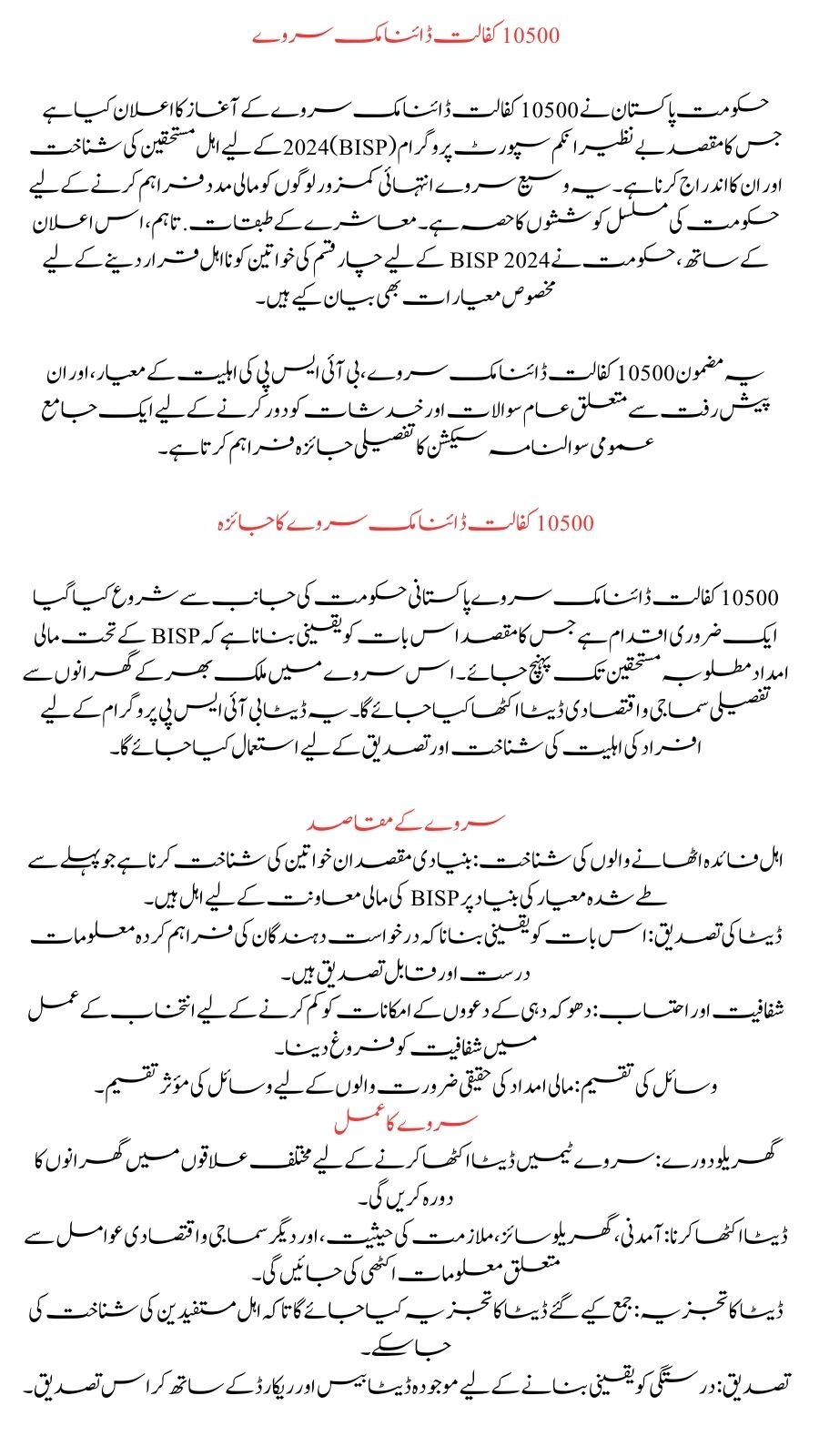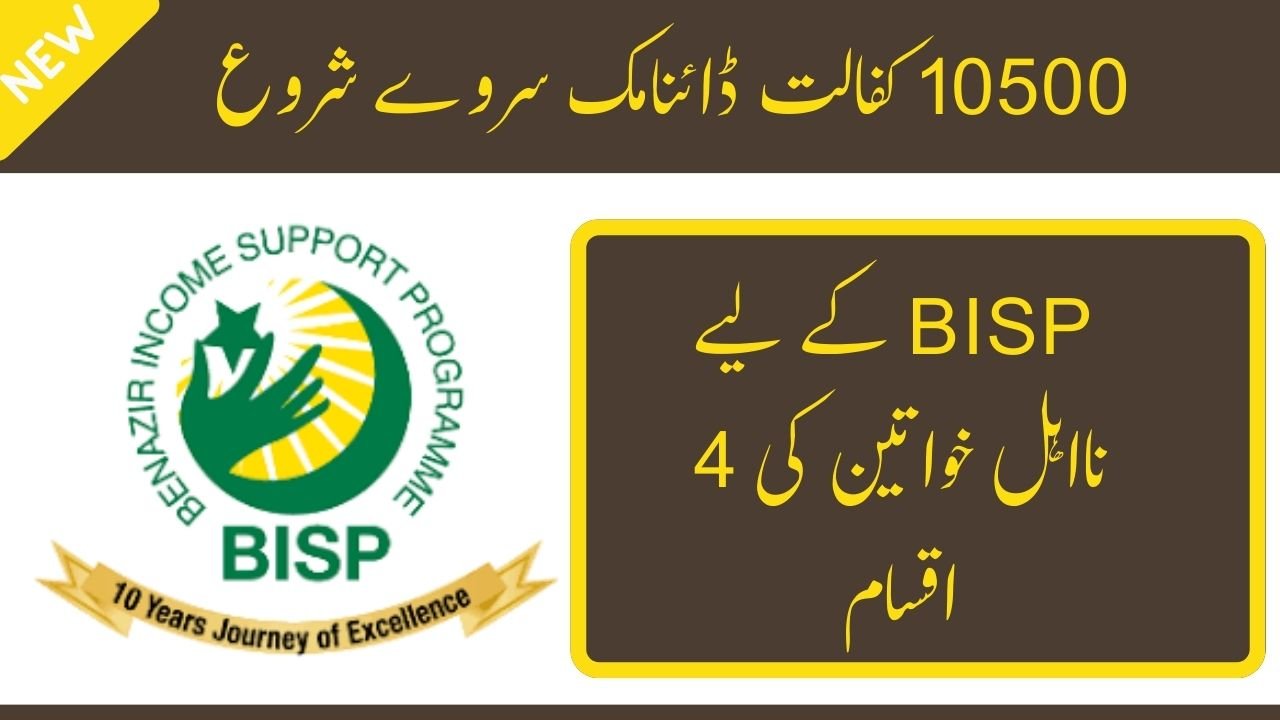10500 Kafalat Dynamic Survey
The Government of Pakistan has announced the commencement of the 10500 Kafalat Dynamic Survey aimed at identifying and enrolling eligible beneficiaries for the Benazir Income Support Programme (BISP) 2024. This extensive survey is part of the government’s continued efforts to provide financial support to the most vulnerable segments of society. However, alongside this announcement, the government has also outlined specific criteria making four types of women ineligible for the BISP 2024.
This article provides a detailed overview of the 10500 Kafalat Dynamic Survey, the criteria for BISP eligibility, and a comprehensive FAQ section to address common questions and concerns regarding these developments.
Overview of the 10500 Kafalat Dynamic Survey
The 10500 Kafalat Dynamic Survey is an essential initiative launched by the Pakistani government to ensure that financial assistance under the BISP reaches the intended beneficiaries. The survey will involve the collection of detailed socio-economic data from households across the country. This data will be used to identify and verify the eligibility of individuals for the BISP program.
Objectives of the Survey
- Identification of Eligible Beneficiaries: The primary objective is to identify women who qualify for the BISP financial support based on the predefined criteria.
- Data Verification: Ensuring that the information provided by applicants is accurate and verifiable.
- Transparency and Accountability: Promoting transparency in the selection process to minimize the chances of fraudulent claims.
- Resource Allocation: Effective allocation of resources to those in genuine need of financial assistance.
Process of the Survey
- Household Visits: Survey teams will visit households across various regions to collect data.
- Data Collection: Information regarding income, household size, employment status, and other socio-economic factors will be gathered.
- Data Analysis: The collected data will be analyzed to identify eligible beneficiaries.
- Verification: Cross-verification with existing databases and records to ensure accuracy.

Four Types of Women Ineligible for BISP 2024
Despite the inclusive nature of the BISP, certain categories of women are deemed ineligible for the financial support under the 2024 program. These criteria are set to ensure that the assistance reaches those who need it the most.
- Women with Higher Income: Women whose household income exceeds the specified threshold are not eligible. This is to ensure that the support is directed towards those with limited financial means.
- Government Employees and Their Wives: Women who are employed by the government or are married to government employees are excluded from the program. This criterion aims to prevent double benefits and ensure fairness.
- Owners of Large Land Holdings: Women owning significant land holdings are not eligible, as they are presumed to have sufficient means to support themselves.
- Women with Multiple Properties: Those who own multiple properties are considered financially stable and are thus excluded from receiving BISP assistance.
Frequently Asked Questions (FAQs)
General Questions
Q1: What is the Kafalat Dynamic Survey?
A1: The Kafalat Dynamic Survey is an initiative by the Government of Pakistan to collect socio-economic data from households to identify eligible beneficiaries for the Benazir Income Support Programme (BISP) 2024.
Q2: Why is the survey called “10500 Kafalat”?
A2: The number “10500” represents the target number of households to be surveyed across the country to ensure comprehensive data collection.
Q3: Who conducts the Kafalat Dynamic Survey?
A3: The survey is conducted by trained officials from the government in collaboration with various data collection agencies.
Q4: How often is the survey conducted?
A4: The survey is conducted periodically to ensure that the data remains current and reflective of the socio-economic conditions of households.
Q5: What areas are covered in the survey?
A5: The survey covers all regions across Pakistan, including urban, semi-urban, and rural areas.
Eligibility and Ineligibility
Q6: What are the basic eligibility criteria for BISP 2024?
A6: Basic eligibility criteria include being a Pakistani citizen, having a valid CNIC, and falling within the specified income and socio-economic parameters set by the program.
Q7: Why are government employees and their wives ineligible for BISP?
A7: Government employees and their wives are excluded to prevent double benefits since government employees are already receiving salaries and other benefits from the state.
Q8: How is “higher income” defined for eligibility purposes?
A8: Higher income is defined based on the poverty line and household income thresholds set by the government. Exact figures may vary and are periodically updated.
Q9: What qualifies as “large land holdings”?
A9: Large land holdings refer to the ownership of land beyond a certain acreage or value, which is considered sufficient to provide financial stability.
Q10: Are there exceptions to these ineligibility criteria?
A10: Generally, these criteria are strictly followed, but there may be exceptional cases evaluated on a case-by-case basis.
Survey Participation
Q11: How can I participate in the Kafalat Dynamic Survey?
A11: Participation is usually initiated by the survey teams visiting households. However, individuals can also approach local BISP offices to express their interest in participating.
Q12: What documents are required during the survey?
A12: Required documents typically include CNICs, proof of income, land ownership documents, and any other relevant socio-economic records.
Q13: Is participation in the survey mandatory?
A13: While not mandatory, participation is highly encouraged for those seeking to benefit from BISP, as it helps ensure accurate and fair allocation of resources.
Q14: What happens if I miss the survey visit?
A14: If you miss a survey visit, you can contact your local BISP office to schedule an alternative visit or provide your data through other designated channels.
Q15: Can the survey data affect my eligibility for other government programs?
A15: The survey data is primarily used for BISP eligibility but may be referenced for other government welfare programs to ensure consistency and avoid duplication of benefits.
Data Privacy and Security
Q16: How is my data protected during the survey?
A16: The government has strict data protection policies in place to ensure that all collected data is kept confidential and used solely for the intended purposes.
Q17: Can I review the data collected about me?
A17: Yes, individuals can request to review their data by contacting their local BISP office and following the official procedure.
Q18: What measures are taken to prevent data misuse?
A18: The government employs various security measures, including encryption, restricted access, and regular audits, to prevent misuse of data.
Q19: Will my data be shared with other agencies?
A19: Data may be shared with relevant government agencies only for the purpose of verifying eligibility and ensuring accurate distribution of benefits.
Q20: How long is my data retained?
A20: Data is retained as long as necessary for the administration of the BISP and related programs, after which it is securely archived or deleted.
Appeals and Complaints
Q21: What if I believe I am wrongly declared ineligible?
A21: If you believe you have been wrongly declared ineligible, you can file an appeal with the BISP office, providing necessary evidence to support your claim.
Q22: How long does the appeal process take?
A22: The duration of the appeal process varies but typically takes a few weeks to a couple of months, depending on the complexity of the case.
Q23: Can I track the status of my appeal?
A23: Yes, you can track the status of your appeal by contacting the BISP office or checking online through the official BISP portal, if available.
Q24: What should I do if I face issues during the survey process?
A24: If you encounter any issues during the survey process, you should report them to the survey team leader or contact the BISP helpline for assistance.
Q25: Are there any penalties for providing false information?
A25: Yes, providing false information can result in penalties, including disqualification from the BISP program and potential legal action.
Conclusion
The 10500 Kafalat Dynamic Survey is a critical step towards ensuring that financial support reaches the most deserving individuals under the Benazir Income Support Programme 2024. By setting clear eligibility criteria and conducting thorough data collection and verification processes, the government aims to enhance the effectiveness and fairness of this social safety net.
While certain categories of women are deemed ineligible, this approach is designed to prioritize those who are in genuine need of assistance. For those affected by these criteria, understanding the detailed eligibility requirements and the survey process is crucial for navigating the BISP system effectively.
Through transparency, accountability, and a commitment to data privacy, the government seeks to build trust and ensure that the BISP continues to serve as a vital lifeline for Pakistan’s vulnerable populations.
